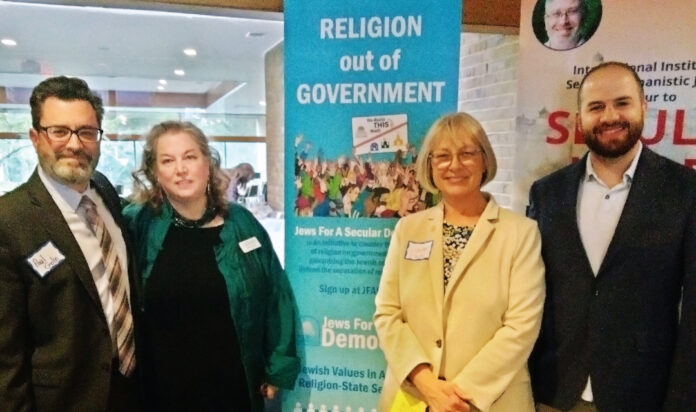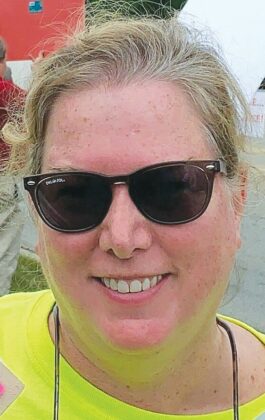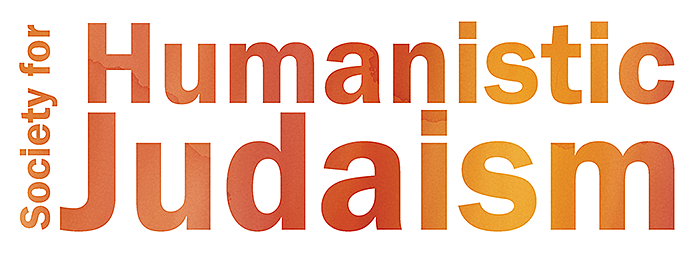
SHJ’s social justice initiative Jews for a Secular Democracy received wonderful coverage of its program “Religion-Government Separation in Michigan Today with State Senators Moss and Bayer,” hosted by the Congregation for Humanistic Judaism of Metro Detroit on April 29, 2023. The following article was written by Esther Allweiss Ingber for the May 16, 2023 issues of The Detroit Jewish News and is reprinted with permission. Photo credit Esther Ingber.
Panel discussion examines religion’s role in state government.
The audience was startled to hear the voice of a pastor bragging about helping even “witches find Christ” as part of his invocation (prayer) to the Michigan State Legislature in Lansing.

State Sen. Jeremy Moss (D-District 7), president pro tempore of the Senate, played the tape “to bring a sense of how it feels to belong to a minority religion” during his participation on a panel discussing “Religion-Government Separation in Michigan Today.” He was joined by State Sen. Rosemary Bayer (D-District 13) and a moderator, Nomi Joyrich, Michigan director of Jews for a Secular Democracy (JFASD).
Rabbi Jeffrey Falick of Congregation for Humanistic Judaism in Farmington Hills and Rabbi Miriam Jerris led a Humanist Havdalah service prior to the program at CHJ on April 29.

Each session of the Senate opens with an invocation, Moss explained, despite the fact that “our Michigan constitution states that government is not supposed to uplift one religion. Some want to lead by inserting their values into governance for the rest of us.”
Bayer, who is not Jewish, shares Moss’ conviction that “religion should be kept separate from governing.” Serving her second term in the Senate, as is Moss, Bayer said she was a “brand-new legislator” when she accepted a Christian colleague’s invitation to attend the body’s weekly Prayer Breakfast Caucus.
“I wanted to go for the camaraderie and getting to know everybody better,” Bayer said, but she was immediately turned off when “everyone opened their Bible, first thing.” She left and has never returned.
The panelists talked more about the bias brought to bear by what Bayer termed: “White Christian favoritism.”
She said, “It’s an excuse for bad behavior in decision-making because ‘somebody else told me what to do. God tells me to do this.’ It’s a pervasive attitude, every day.” No one is forced to stay in the room and listen to Christian theology-laced invocation prayers, “but then the same notions come out in speeches on their floor.”
“They have an absolute right to believe that,” Moss said, “but if it impacts the law-making for those who don’t subscribe to that religious value; that’s when it becomes a problem in the state.”
Bayer remembered the intimidation the legislators and staff felt on April 30, 2020, when a group of white Christian Nationalists with assault weapons went into the Capitol building for their so-called “American Patriot Rally.”
She now keeps a bulletproof vest under her desk. “We learned later that they were practicing for the Jan. 6 coup attempt in Washington, D.C.,” Bayer said, and that “their full intent was to shoot all the legislators” — “burn down the building, too,” Moss interjected — “capture the governor and kill her.”
New Leadership in Lansing
Before this year, the Republican majority with its Christian bias wouldn’t pass legislation acceptable to a majority of Michiganders, such as securing access to reproductive healthcare. A more progressive agenda is now possible in the wake of the nonpartisan commission that eliminated gerrymandered districts, by drawing new maps reflecting the 2020 census. Democrats held on to the top offices in the November election and won their first majority in many years in both chambers of the state legislature.
Although voters approved the “Reproductive Freedom for All” Proposal 3 in 2022, it was important to Gov. Gretchen Whitmer and the Democrats to repeal the state’s 1931 anti-abortion rights legislation. The so-called “zombie law” was automatically triggered to go into effect when the Supreme Court overturned Roe v Wade last year, but Whitmer put a hold on enforcing the law until the election results.
“In 100 days, we repealed the portion of the [penal] code that made abortion a felony,” Bayer said. But there is a long way for legislators to go with “750 restrictions scattered throughout our code that restrict the ability for women to get the services they need.”
Similarly, Bayer said Michigan has a number of laws pertaining to the marriage of minors. “The idea that you can marry at an early age is based on conservative religious standards,” she said. A set of bills under consideration includes one banning marriage under age 18 without exception. “That would be a change to something that’s been on the books forever.”
Moss was confronted by religious objections during the years he worked on an amendment to the Elliott-Larsen Civil Rights Act, an anti-discrimination measure he felt needed to include protecting the LGBTQ+ community.
“Religious freedom was used as an excuse to discriminate against others,” Moss said. “One lawmaker actually wanted to allow firing someone whose religion doesn’t match his. But I’m proud to say we did pass the amendment with no added text, so religion stayed separate from civil rights in Michigan.”
He also spoke about the 6-foot Christmas — er, “holiday” — tree on display each December at the Capital. A menorah next to it has to be within smaller parameters and “requires extra labor to be taken down each night.” Bayer finds it all “wildly unfair. Some religions don’t have any of those symbols. There is always somebody who’s going to be left out.”
Joyrich brought up the Secular Values Caucus in New Hampshire and Secular Democracy Caucus in Minnesota. The caucuses include “legislators from various faiths and no faith who are committed to defending the separation of religion and government, protecting the rights of both religious and non-religious people and advancing science and evidence-based public policy.”
Moss and Bayer went on the record to say they would be open to starting such a caucus in Michigan.
Carol Ogusky of Sylvan Lake was among 75 attending the program — plus 100 who registered to watch on Zoom. “Following the engaging conversations,” she said, “I came away feeling that (Moss and Bayer) are both extremely hardworking, conscientious politicians. They are acting indefatigably to protect the safety and freedom and security for us Michiganders.”
Panel co-sponsors with CHJ were Detroit Jews for Justice, Distill Social, Fems for Democracy, Jewish Community Relations Council/AJC, Michigan Unitarian-Universalist Social Justice Network, National Council of Jewish Women and Social Action Committee of Temple Kol Ami.
Jews for a Secular Democracy

Nomi Joyrich
Jews for a Secular Democracy (JFASD) is an initiative of the Society for Humanistic Judaism (SHJ), a nonpartisan national organization with its headquarters in Farmington Hills.
“We seek to strengthen the wall between religion and government,” said Nomi Joyrich. A political activist and community organizer, she previously was a social worker and small business owner.
Still an organizer for Michigan Unitarian Universalist Justice Network after four years, she was recruited to JFASD in early 2022 as its first statewide coordinator. The Donald R. and Esther Simon Foundation provided the launch grant for the program. Additional local supporters and national grantors have kept the initiative going.
JFASD “makes the case that the shared values of equality, inclusion and fairness are the true American ideals intended by the First Amendment,” said SHJ Executive Director Paul Golin, visiting Metro Detroit from New York. Golin for nearly two decades has helped Jewish organizations and movements understand key trends affecting North American Jewry, such as intermarriage, engagement, disaffiliation and inclusion.
Golin said religious fundamentalists are now at “the height of their power, with a Supreme Court doing generational damage. This is rule-by-minority, as most Americans are with us on the issues. We now have to rebuild our own ground game, and we see JFASD as adding one important angle in support of the many excellent organizations and initiatives doing the work.”
Joyrich develops programs and activities with partners from different Jewish organizations and streams of Judaism. Especially memorable was the first event she arranged, a topical panel at Temple Kol Ami featuring Reform Rabbi Brent Guttmann, Modern Orthodox Rabbi Asher Lopatin, executive director of Jewish Community Relations Council/AJC, and Conservative Rabbi Blair Nosanwisch of Adat Shalom Synagogue.
The volunteers Joyrich organized obtained more than 15,000 signatures in support of two November 2022 ballot initiatives: Proposal 2, defending the right to vote, and Proposal 3, allowing reproductive freedom. Voters passed both. A future JFASD program “will have to do with the role of school and library boards, and Christian nationalist attempts to take them over and to ban books.”
Joyrich also plans to “present an interfaith group to talk about how various faiths are impacted by attempts to blur the line between religion and government.”
“We feel Nomi has ‘a proven concept’ for a professional state-based JFASD organizer — mobilizing volunteers and building coalitions that bring Jewish voices to religious freedom,” Golin said. “We would like to replicate our Michigan work in other states where these issues remain in jeopardy.”
In his introduction to the panel, Golin said, “We hope to bring as many diverse Jewish approaches as possible to church-state separation issues, from secular to religious. There is a remarkable consensus in the Jewish community across political and religious ideologies on issues of religious freedom.”
Joyrich added, “Our goal is to help more Jews and allied friends and family articulate these ideals to their neighbors and to their lawmakers. We’re already reaching thousands; we hope to grow from here.”
For information, contact nomijfasd@gmail.com and jfasd.org.





Leave a Reply